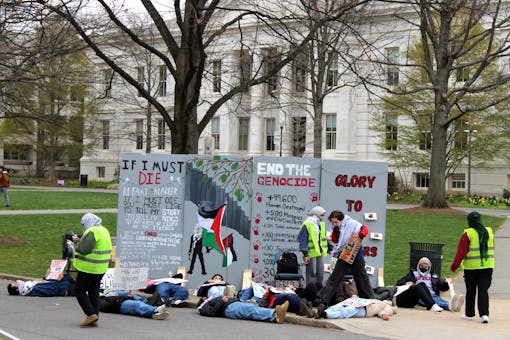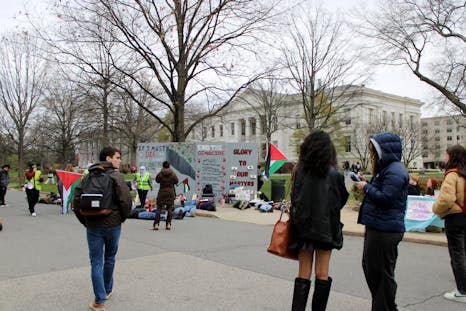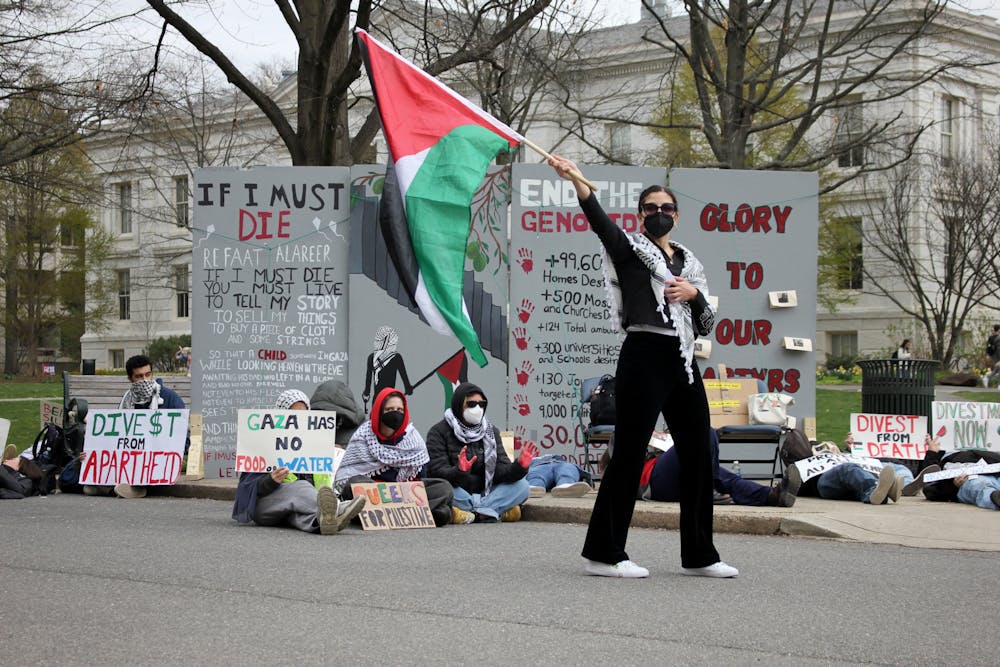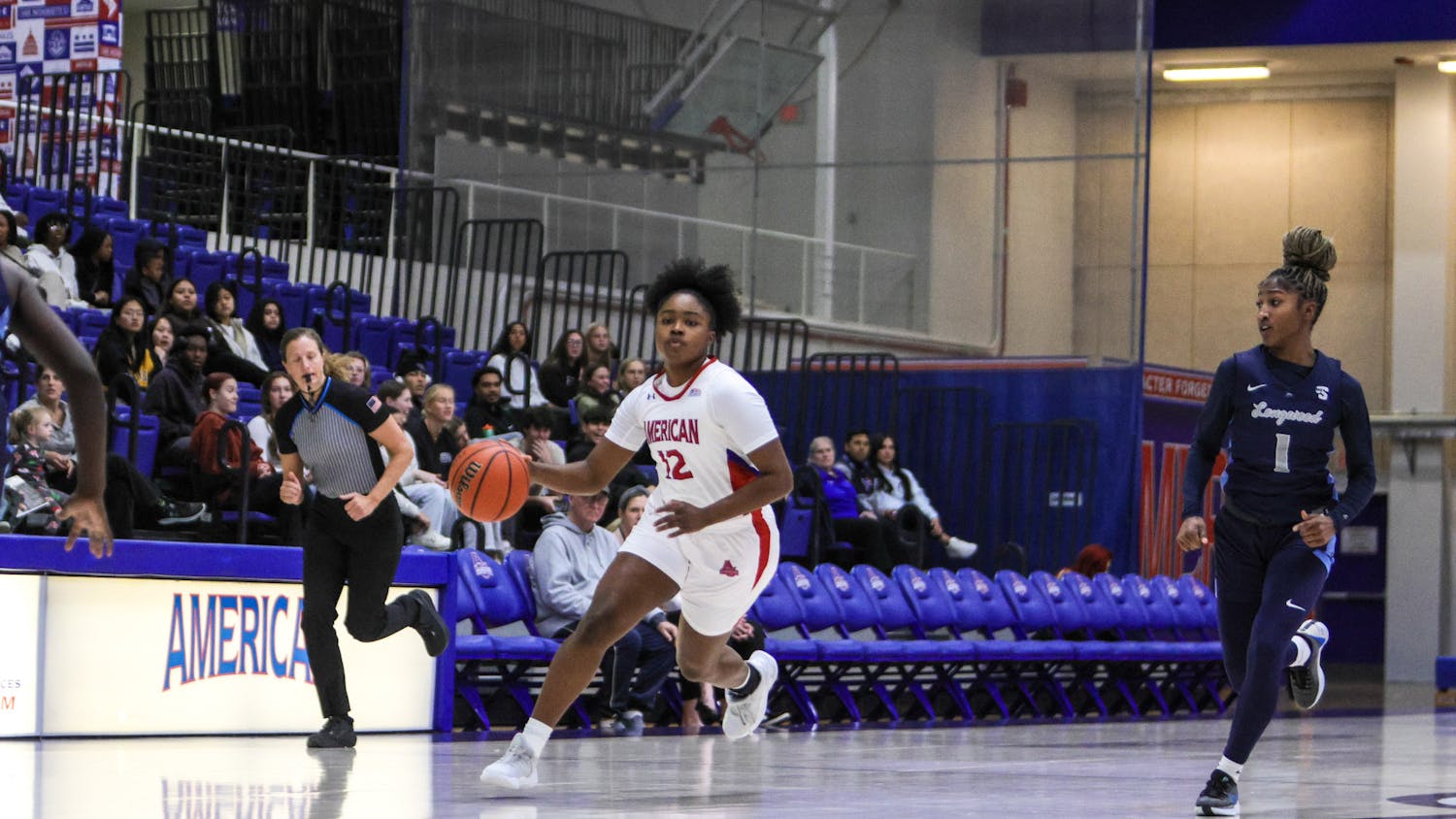For more than three hours on March 22, organizers from American University’s chapter of Students for Justice in Palestine read the names and ages of children killed in the Israeli siege on the Gaza Strip while over a dozen members lay on the ground. Beginning with children aged zero and continuing in age order, the readers had only reached the names of eight-year-old children by the end of the demonstration.
SJP wrote in a statement to The Eagle that this demonstration was “a small-scale representation of the over 32,000 Palestinian lives that have been ruthlessly stolen from Gaza by the Israeli Occupation Forces.” Members laid in a group holding signs or raising red-painted hands to represent “how the blood of Palestinians are on our hands as AU students and U.S. citizens as our tax payer dollars have been used to directly fund and carry out Israel’s genocide on Gaza.”
The die-in marked the end of the group’s observance of Palestine Liberation Week, which included daily fundraising and other events. Throughout the week, SJP’s mock apartheid wall — a representation of the West Bank barrier painted with the number of those killed, Refaat Alareer’s “If I Must Die” poem, red handprints and other symbols — stood on the quad.

“American University administration has continued in their complicity for far too long by continuing to suppress the students dissent against the ongoing genocide on Gaza that Israel, alongside the American government, have been committing … against the people of Gaza,” wrote SJP.
In response, Elizabeth Deal, the assistant vice president for community and internal communication, wrote in a statement to The Eagle that “AU continues to support our community and promote safety on campus as we address challenging topics. As [students engage] in dialogues and activities, we encourage them to do so in safe and constructive ways consistent with our [policies].”
As organizers took turns reading names, small crowds formed to watch and listen.

Jae Baker, a sophomore in the College of Arts and Sciences, said they stopped to appreciate SJP’s demonstration.
“I think the die-in is an incredible action. I think it’s really creative as well,” they said. “I commend SJP. I think what they’re doing is incredibly brave, incredibly radical and they’re taking change into their own hands — SJP and allies, of course.”
Daniel Zavilowitz, a sophomore in CAS, stopped to watch, saying that he had tried to learn more about the conflict’s history and attended “really powerful” marches for Palestine in the past few months.
“As a white man, I want to be able to use whatever power I have in this country to use my voice and advocate for these people who are literally getting ignored right now,” he said. “People are walking by, people are not even taking the time to listen to these people whose families are literally dying … It’s really selfish to not want to learn about what’s going on and advocate for these people.”
Riley Phoenix, a senior in the School of International Service, who stopped to watch as classes switched, echoed Zavilowitz’s concerns.
“Who are we? How are we humans?” she asked. “How are we okay with hearing the names of four-year-olds who are being murdered — she has to have said at least a hundred of them, of children … How do we feel nothing when we are seeing pictures of dead kids and people on fire?”
SJP acknowledged the “tremendous support and solidarity” from passersby in their statement to The Eagle, referencing students with keffiyehs — traditional scarves associated with Palestinian resistance and resilience — and others who stopped to join the action.
“AU students have been showing for months now that they support Palestine and oppose the genocide that has been normalized and gone un-condemned by American University,” the organization wrote. “This administration has shown a clear disregard for what the vast majority of their students, faculty, and staff advocate for by furthering attempts of stifling the advocacy for Palestinian human rights and dignity.
Across the way, AU’s chapter of Students Supporting Israel set up a pre-planned tabling event with signs condemning Hamas and calling for the release of Israeli hostages. The group tables regularly, sometimes several times a week. Multiple bystanders raised concerns about SSI’s presence.
“Everybody has the right to their cause or whatever,” Baker said. “But I think there is an unacknowledgement of the struggle for liberation, the struggle to have your humanity acknowledged.”
Ethan Kassar, a freshman in the School of Public Affairs and a member of SSI, expressed hurt for those killed. He said he believes both Israelis and Palestinians have claims to the land, adding that he believes Hamas is to blame for the ongoing violence and deaths.
“As just a human, I hurt so much for anyone who's lost their life — any innocent life that's been taken during this conflict,” he said. “It pains me. Golda Meir, the first female prime minister of Israel, has, I think, a quote that’s really hit home for me during this conflict. And she said something along the lines of ‘we can forgive them for killing our sons, but we can never forgive them for making us kill theirs.’ It’s horrible what’s happening.”
Kassar raised concerns about who the phrase “glory to our martyrs” referred to and the red handprints on SJP’s signs, worrying that the handprints’ origin referenced the killing of two Israeli soldiers in the West Bank in 2000.
SJP explained in a statement to The Eagle that it uses the phrase “glory to our martyrs” to honor the “over 32,000 Palestinians who have been viciously murdered, from the infants who barely lived a few days to the elders who have been repeatedly displaced from their homelands and never got to see their country free.”
Red-painted hands are not unique to protests against the war in Gaza, and SJP clarified in a statement to The Eagle that their members used the symbol to represent that U.S. citizens “have blood on [their] hands” because their tax dollars are supporting Israel’s actions in the ongoing conflict.
Despite these concerns and the tensions with SSI, SJP wrote that it will continue to honor victims of the conflict and call for Palestinian liberation.
“But our dedication to honoring our martyrs would not be wavered or disrupted no matter what we were confronted with,” SJP wrote. “We can only aspire to have the same steadfastness Palestinians in the occupied lands have, which is why our dedication to our people and our movement continues to be unwavering.”
This article was edited by Zoe Bell, Abigail Turner and Abigail Pritchard. Copy editing done by Luna Jinks, Isabelle Kravis





